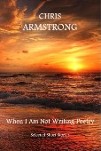I don’t write many long poems … most of my poems are less than a page, but occasionally an idea hits me that merits something more – or so I think at the time! These poems take longer to write and usually demand some research work – probably why there are so few of them – only four in my Mostly Welsh collection.
Not so long ago I had this idea to do something on TIME. It has fascinated me for a long (err!) time – how we see it – experience it – understand it – WHAT it is! I remember that it was only just over 100 years ago that we decided to regulate time… as travel and then public transport, became more common, it became more convenient for people in Aberystwyth to know that the train from London would arrive at THEIR 10:30 rather than London’s 10:30… which might have been as much as half an hour adrift from Welsh time! So travel, particularly on the railways helped to control time (some of you may think that the railways still do – though not in a good way!)! Time zones arrived in the world in 1883.
But the whole idea of measuring time is artificial, isn’t it? Who says there are sixty minutes in an hour? Why sixty? And don’t get me started on the physics of time and gravity! Mainly because that is the bit I struggle to understand! And then I heard someone on the radio say that you can never prove the existence of time and that thought was niggling away at my mind, I suppose.
And as it sometimes happens, right at that moment (see my previous post on coincidences) I heard a review of Carlo – I should say Professor Carlo Rovelli’s book – The Order of Time. It is a beautifully written book – written for my simple mind – and he makes a complex subject easy – or easier than it might have been – but that isn’t to say that it is an easy read – I probably understood about a fifth of it! There are frequently simple sentences that require re-reading. Several times. Statements such as
Time passes more slowly in some places
There is no such thing as past or future
Time is the measurement of change (Aristotle)
All require a little thought… and make writing quite difficult! My problem was that our language – our understanding of our world – revolves around the concept (a concept) of time: “The poems take longer to write” – “Not so long ago I had this idea” – “just over 100 years ago” … “the sentence I write next”… and so on.
But the book provided some of the background for what became THE ELEGIES OF TIME.
FIVE of them… making a work as long, I think as any poetry I have written. Fortunately they are poems so you do not have to worry as there is not much science in them! Like – I suppose – many of my poems, they have autobiographical elements – a DWELLING on the past… on lost times… on existence… on eternity…
Oh! I have just suggested that the poem dwells on the past! The past that, like the future, like eternity does not exist!!! – what more could a poet want?! A freedom to write of something that only he knows – that no one else – none of his readers – can ever see!
The Elegies of Time appears (appropriately enough!) in Lost Time: Chorus and Other Poems.

